
The National Geospatial-Intelligence Agency (NGA) is a combat support agency within the United States Department of Defense whose primary mission is collecting, analyzing, and distributing geospatial intelligence (GEOINT) in support of national security. Initially known as the National Imagery and Mapping Agency (NIMA) from 1996 to 2003, it is a member of the United States Intelligence Community.
Open source intelligence (OSINT) is the collection and analysis of data gathered from open sources to produce actionable intelligence. OSINT is primarily used in national security, law enforcement, and business intelligence functions and is of value to analysts who use non-sensitive intelligence in answering classified, unclassified, or proprietary intelligence requirements across the previous intelligence disciplines.
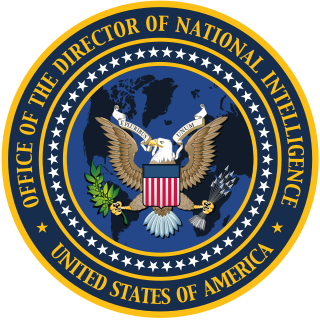
The director of national intelligence (DNI) is a senior cabinet-level United States government official, required by the Intelligence Reform and Terrorism Prevention Act of 2004 to serve as executive head of the United States Intelligence Community (IC) and to direct and oversee the National Intelligence Program (NIP). All IC agencies report directly to the DNI. The DNI also serves, upon invitation, as an advisor to the president of the United States, the National Security Council, and the Homeland Security Council on all intelligence matters. The DNI, supported by the Office of the Director of National Intelligence (ODNI), produces the President's Daily Brief (PDB), a classified document including intelligence from all IC agencies, handed each morning to the president of the United States.

The Bureau of Intelligence and Research (INR) is an intelligence agency in the United States Department of State. Its central mission is to provide all-source intelligence and analysis in support of U.S. diplomacy and foreign policy. INR is the oldest civilian element of the U.S. Intelligence Community and among the smallest, with roughly 300 personnel. Though lacking the resources and technology of other U.S. intelligence agencies, it is "one of the most highly regarded" for the quality of its work.

The United States Naval Criminal Investigative Service (NCIS) is the primary investigative law enforcement agency of the U.S. Department of the Navy. Its primary function is to investigate major criminal activities involving the Navy and Marine Corps, though its broad mandate includes national security, counterintelligence, counterterrorism, cyberwarfare, and the protection of U.S. naval assets worldwide. NCIS is the successor organization to the former Naval Investigative Service (NIS), which was established by the Office of Naval Intelligence after the Second World War.

The Air Force Office of Special Investigations is a U.S. federal law enforcement agency that reports directly to the Secretary of the Air Force. OSI is also a U.S. Air Force field operating agency under the administrative guidance and oversight of the Inspector General of the Department of the Air Force. By federal statute, OSI provides independent criminal investigative, counterintelligence and protective service operations worldwide and outside of the traditional military chain of command. Proactively, OSI identifies, investigates, and neutralizes serious criminal, terrorist, and espionage threats to personnel and resources of the Air Force, Space Force, and the U.S. Department of Defense, thereby protecting the national security of the United States.
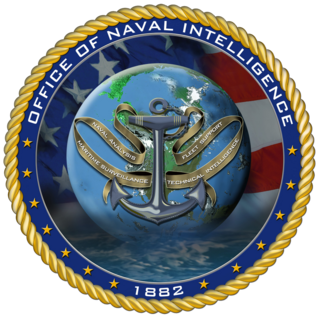
The Office of Naval Intelligence (ONI) is the military intelligence agency of the United States Navy. Established in 1882 primarily to advance the Navy's modernization efforts, it is the oldest member of the U.S. Intelligence Community and serves as the nation's premier source of maritime intelligence.
The Defence Strategic Policy and Intelligence Group (SP&I) of the Australian Government Department of Defence is responsible for defence diplomacy, strategic policy, international security, and military intelligence co-ordination and advice to the Prime Minister of Australia, Minister for Defence, Secretary of the Department of Defence, and Chief of the Defence Force. The Defence Strategic Policy and Intelligence Group is led by the Deputy Secretary for Strategic Policy and Intelligence and comprises three policy divisions and two intelligence agencies.

Lieutenant General Joseph Francis Carroll was the founding director of the Defense Intelligence Agency (DIA) and the first commander of the U.S. Air Force Office of Special Investigations.
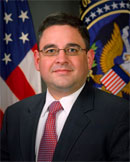
Eliot A. Jardines was the first Assistant Deputy Director of National Intelligence for Open Source (ADDNI/OS) in the United States.
The Australian Defence Organisation (ADO) is composed of the armed forces of the Commonwealth of Australia, the Australian Defence Force (ADF), and the Australian Public Service government department, the Department of Defence which is composed of a range of civilian support organisations.
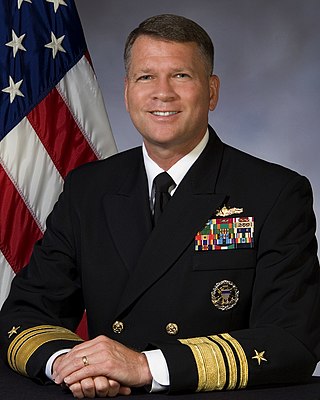
David John "Jack" Dorsett is a corporate vice president for cyber and C4 at Northrop Grumman, and a retired vice admiral of the U.S. Navy. He was the first Deputy Chief of Naval Operations for Information Dominance and 63rd Director of Naval Intelligence. He served as the Director of Intelligence, Joint Chiefs of Staff from 2005 to 2008 prior to assuming his position on the Chief of Naval Operations staff.

Francis Xavier Taylor was the Under Secretary of Homeland Security for Intelligence and Analysis at the U.S. Department of Homeland Security (DHS), nominated by President Obama in 2014. In that role, he provided the Secretary, DHS senior leadership, the DHS components, and state, local, tribal and private sector partners with homeland security intelligence and information they need to keep the country safe, secure and resilient. DHS Office of Intelligence and Analysis is a member of, and the Department’s liaison to, the U.S. Intelligence Community.

Kevin J. Jacobsen is a United States Air Force retired brigadier general who served as the 16th Commander of the Air Force Office of Special Investigations (AFOSI), Quantico, VA. This field operating agency is responsible for providing commanders of U.S. Air Force activities independent, professional investigative services regarding fraud, counterintelligence, and major criminal matters. The investigations are conducted by a worldwide network of military and civilian special agents stationed at major U.S. Air Force installations and a variety of special operating locations.
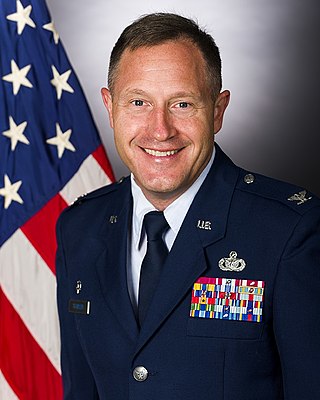
Kirk B. Stabler is a retired United States Air Force Colonel who served as the 18th Commander of the U.S. Air Force Office of Special Investigations (AFOSI), Quantico, Virginia. As the AFOSI Commander, Stabler oversaw AFOSI's worldwide network of over 2,000 military and civilian special agents and over 500 unsworn members stationed at major Air Force installations and a variety of worldwide special operating locations.

Leonard Eric Patterson is currently serving as the Director of the Federal Protective Service. Patterson is also a retired United States Air Force Brigadier General and was the 14th Commander of the Air Force Office of Special Investigations (AFOSI), Andrews AFB, MD. As the AFOSI Commander, Patterson oversaw AFOSI's worldwide network of military and civilian special agents stationed at major Air Force installations and a variety of special operating locations.

Deirdre Walsh is Vice President of Washington, D.C. Operations for Ball Aerospace & Technologies. Previously as a federal government employee and member of the United States Intelligence Community, she served as the first chief operating officer (COO) for the Office of the Director of National Intelligence from February 2018 to May 2020.

Neil Wiley is an American intelligence official and military veteran who served as Principal Executive in the Office of the Director of National Intelligence (DNI) performing the duties of Principal Deputy Director of National Intelligence from May 13, 2020 until February 2021.















